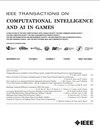Creating AI Characters for Fighting Games Using Genetic Programming
Q2 Computer Science
IEEE Transactions on Computational Intelligence and AI in Games
Pub Date : 2017-12-01
DOI:10.1109/TCIAIG.2016.2642158
引用次数: 24
Abstract
This paper proposes a character generation approach for the M.U.G.E.N. fighting game that can create engaging AI characters using a computationally cheap process without the intervention of the expert developer. The approach uses a genetic programming algorithm that refines randomly generated character strategies into better ones using tournament selection. The generated AI characters were tested by 27 human players and were rated according to results, perceived difficulty and how engaging the gameplay was. The main advantages of this procedure are that no prior knowledge of how to code the strategies of the AI character is needed and there is no need to interact with the internal code of the game. In addition, the procedure is capable of creating a wide diversity of players with different strategic skills, which could be potentially used as a starting point to a further adaptive process.利用遗传编程为格斗游戏创造AI角色
本文提出了一种针对《M.U.G.E.N.》格斗游戏的角色生成方法,即无需专业开发者的干预便能够使用廉价的计算过程创造出引人入胜的AI角色。该方法使用遗传编程算法,通过锦标赛选择将随机生成的角色策略细化为更好的角色策略。生成的AI角色由27名人类玩家测试,并根据结果、感知难度和游戏玩法的吸引力进行评分。这一过程的主要优势在于无需事先了解如何编写AI角色的策略,也无需与游戏的内部代码进行交互。此外,这一过程能够创造出具有不同战略技能的多样化玩家,这可能被用作进一步适应过程的起点。
本文章由计算机程序翻译,如有差异,请以英文原文为准。
求助全文
约1分钟内获得全文
求助全文
来源期刊

IEEE Transactions on Computational Intelligence and AI in Games
COMPUTER SCIENCE, ARTIFICIAL INTELLIGENCE-COMPUTER SCIENCE, SOFTWARE ENGINEERING
CiteScore
4.60
自引率
0.00%
发文量
0
审稿时长
>12 weeks
期刊介绍:
Cessation. The IEEE Transactions on Computational Intelligence and AI in Games (T-CIAIG) publishes archival journal quality original papers in computational intelligence and related areas in artificial intelligence applied to games, including but not limited to videogames, mathematical games, human–computer interactions in games, and games involving physical objects. Emphasis is placed on the use of these methods to improve performance in and understanding of the dynamics of games, as well as gaining insight into the properties of the methods as applied to games. It also includes using games as a platform for building intelligent embedded agents for the real world. Papers connecting games to all areas of computational intelligence and traditional AI are considered.
 求助内容:
求助内容: 应助结果提醒方式:
应助结果提醒方式:


